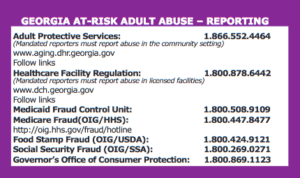Lately our clients have been asking about the new changes to Medicare heading our way. The first change is the Medicare ID number. The second change is to the Medigap Plan F. So, let’s talk about a bit more about these changes.

New Medicare Numbers
In April of this year, Medicare started sending out new Medicare cards to all of 60 million of its beneficiaries. This new card will have a new ID number for everyone (a number that is not the beneficiary’s social security number) that will be made up of a series of 11 numbers and letters. This process will cost about $242 million, and Georgians can expect to receive their cards sometime before April 2019.
To learn more, please visit https://www.cms.gov/medicare/
Medigap Plan F
In addition to having Medicare Part A and B, many of clients have a Medigap plan. This is non-governmental secondary insurance plans that help cover what Medicare does not pay for. About 500,000 Medicare beneficiaries have a Medigap plan, and about 53% of them have a Medigap Plan F. Plan F is popular because it almost eliminates any extra out-of-pocket costs after the premiums are paid. Plan F pays the deductibles for Part A and B, all Part B excess charges, Part A hospital and coinsurance costs, Skilled Nursing Facility (SNF) coinsurance, and more. Unfortunately, this plan will no longer be sold as an option to Medicare beneficiaries who do not already have Plan F in place in 2020 as part of the Medicare Access and CHIP Reauthorization Act of 2015.



